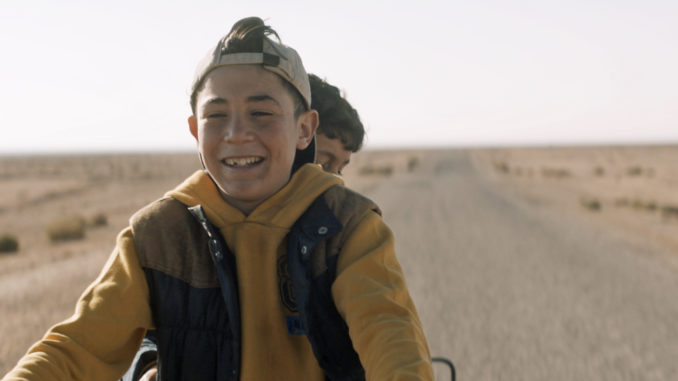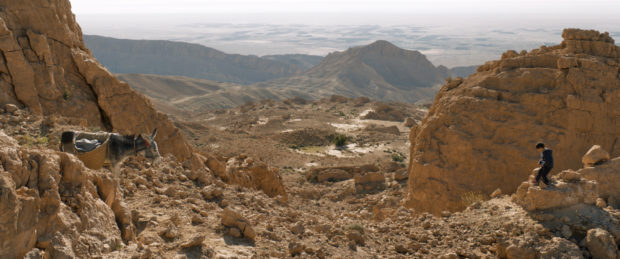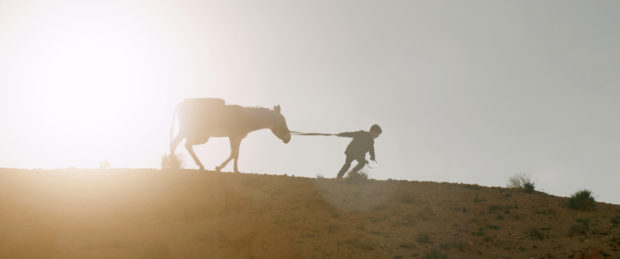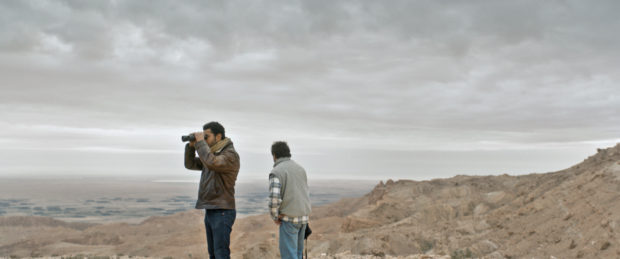
Review Fix chats with The Nefta Football Club director Yves Piat, who discusses the inspiration for the film and the goals for it moving into Oscar season.
Review Fix: What inspired this film?
Yves Piat: I went to Morocco for an idea of a feature film that was happening in Casablanca but soon, I realized that I totally idealized this city. I went to the Zagora desert and I knew at that moment that the desert would be an important part of my future project …
The script is based on something that happened to me when I was 14 years old. With one of my friends, we found several kilos of cocaine, we put them on the moped and while we did not know what to do with it, we threw it in the water. That’s a story I kept for myself for all these years …
Another time, when I went to Morocco, I talked to a drug smuggler, who was a friend’s brother, who explained to me how things were happening at the border. The story of the walkman is partly true… Some drug dealers have used donkeys with whistling, but I found it more amusing to replace this whistling with known music that can generate a comical situation and misunderstanding.
Review Fix: How difficult was this film to put together?

Piat: The Nefta Football Cub Project could have been a failure, but I was lucky enough to make it. First, you need money. And it’s not easy to convince partners in France when you want to film in North Africa, in an Arabic language moreover.
I went to Morocco to meet with authorities to make the project making, locations scouting and so on much easier but in the end, my production team invited me to film the movie in Tunisia for economic reasons, which finally happened to be the right place.
I was even informed that it snowed in the Moroccan desert in the same period!
At the beginning, we planned 8 days of shooting. We finally did it in 6 days but due to last-minute lack of money issues, I had to re-write the script one week before the shooting started. I had to add night scenes to extend daylight shootings because we were shooting in winter. It finally gives a very particular atmosphere to the movie.
While we were working on the shooting schedule, riots started all over the country, and roadblocks were settled all the way leading to South Tunisia. It was decided then to postpone the shooting since it became really dangerous to go there with a shooting team. We were not sure how the situation will evolve. But as far as I was concerned, I didn’t want to go back to Paris. I had found the perfect children to play the brothers of my film after one month of casting with non-professional actors. I didn’t want to lose them.
Meanwhile, the Franco-Algerian actor who was supposed to play one of the drug dealers decided to cancel his participation for shooting the scenes because he was afraid of the political events happening in Tunisia. With my producer, we had to find another acting duo very quickly. Lyes Salemaccepted the role in the film just after reading the script and he even suggested his friend Hishem Mesbah play the other drug dealer. This duo really fits perfectly in the film. Again, I was very lucky.
Also, the camera equipment was coming from France and stayed stuck in the airport as we were supposed to travel with it to the south the day after its arrival. Eventually, the situation returned to normal and we drove with the team, but we still met a lot of unexpected difficulties on the way. I remember this day and night of neverending rain that changed our plans and settings: it rained so hard that the salted lake we were supposed to shoot some scenes at literally became a lake!
Review Fix: What films have inspired it the most?

Piat: I think of “Babel” of Inaritù or “400 coups” of Truffaut but there is also “Ali Zaoua: prince of the streets” by Nabil Ayouch and written by my friend Nathalie Saugeon, all these films and many others have fed my inspiration. The grandiose spaces have imposed cinemascope format and necessarily frames that sometimes refer to those of the western.
Review Fix: What have you learned about yourself through this entire process?
Piat: Before this movie, I had written my scripts almost entirely in my office. I love working on the scenario structure, but since this film, while I have an interesting project, which deserves to be developed, I start to, very early in the writing process, to go to places where the action takes place to confront my story ideas and turn them to reality. Very often (not to mention every time) reality redistributes the cards and makes you question the whole story you have written. It is, therefore, a rather violent but beneficial and essential process to bring your narrative structure to life. Another essential thing that I have developed since this film is the “letting go” to deal with the innumerable unknowns at the last minute and know how to use them for the benefit of the film and so not be stuck on everything you had prepared upstream.
Review Fix: What was the feeling like on set?
Piat: All the team was focused and knew it would be a real challenge with children and animals on set, in the middle of a desert, working and speaking in a foreign language with only 6 days of shooting. I was pretty confident despite all the unexpected problems. I trusted my talented director of photography and my gifted first assistant director. The third day of shooting was really complicated. We lost two hours of shooting because one of the truck got lost in the desert on its way to the shooting set. There was also this dramatic scene between the children and the donkey. We had to catch the sunset behind the hill. As the days were quite short during this winter season, we didn’t have a lot of time. I had to direct two very young actors in a very complex scene. I have to admit I had some pressure on my shoulders. There was also this moment where the children riding the motorcycle nearly fell because of a giant hole on the road. It scares the life out of me!
Review Fix: Why is the topic of this film important today to you?
Piat: The concept of borders is fascinating to me. This story of the two children and the two smugglers lost in the middle of nowhere, in a no man’s land between Tunisia and Algeria was a way to highlight the absurdity of this concept. The film is also about the fact that nobody really controls their own destiny. It’s often the life that decides for you, in an ironic way sometimes.
Review Fix: What’s next?

Piat: I am currently working on a feature film taking place in Jerusalem. An Israeli diplomat suffocates to death while eating sheep, a few days before a peace agreement could be signed. The forensics discover an Israelian bullet in the diplomat’s aorta and the police investigation reveals that the sheep are coming from Palestinian territories. The American emissary in charge of the success of this peace agreement has to handle the situation with extreme caution.
Review Fix: Anything else you’d like to add?
Piat: I am really glad the film has been seen by audiences worldwide, we received so many awards, some of these awards are Oscar-qualifying and it would be a dream come true to be nominated for the Oscars 2020. It’s amazing to see how the audience reacts to the film in festivals. I wished the children who starred in my film could have attended all of this. My production team and I tried to make them come to France to attend the first festival where the movie was shown. We even bought plane tickets and rented a place. But the French authorities refused the visa at the last minute, arguing the children could have stayed in France illegally after the festival. It’s a bit ironic for the actors of a film playing with the idea of a border. To be honest, I’m quite ashamed with the current immigration policy of my own country.


Leave a Reply